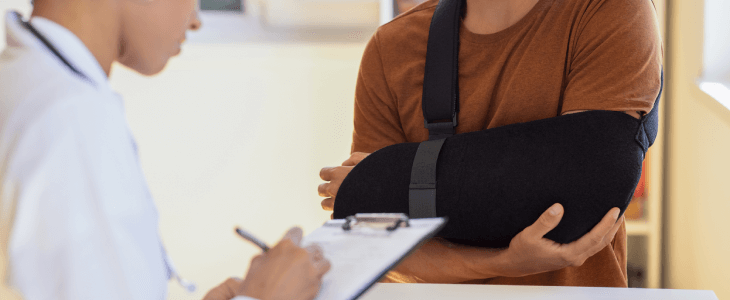Understanding Personal Injury Lawsuits
A personal injury lawsuit allows an injured person to seek financial compensation from the party responsible for their injuries. These legal actions arise when someone suffers harm due to another’s careless, reckless, or intentional actions.
Personal injury cases encompass a wide range of situations, including:
- Car Accidents – Collisions often result when drivers violate traffic laws, drive while distracted, or operate vehicles under the influence of substances. The resulting injuries can often be catastrophic.
- Slip-and-Fall Incidents – These incidents typically occur on poorly maintained properties where owners have failed to address hazardous conditions such as wet floors, uneven surfaces, or inadequate lighting.
- Medical Malpractice – These cases arise when healthcare providers deliver care that falls below the accepted standard, leading to preventable injuries or worsened medical conditions.
- Workplace Accidents – Workers suffer injuries when employers fail to maintain safe conditions, provide proper training, or supply appropriate safety equipment for potentially dangerous tasks.
- Product Liability – Manufacturers can be held responsible when their defective or dangerous products harm consumers who use them as intended.
- Construction Accidents – Workers on construction sites face unique hazards, including falls from heights, equipment malfunctions, and unsafe structural conditions that can lead to serious injuries.
In New York, you generally have three years from the date of your injury to file a personal injury lawsuit, though there are exceptions for certain types of cases. This legal deadline makes it crucial to consult with an attorney promptly after your injury occurs.
Initial Consultation and Case Evaluation
The personal injury process begins with an initial consultation with an attorney. At Dell & Dean, PLLC, we offer free consultations where we will discuss the details of your case and determine whether we can help you pursue compensation.
During this first meeting, we will ask about:
- How the injury occurred
- Who might bear responsibility
- The extent of your injuries
- Medical treatment you’ve received
- How the injury has affected your daily life
- Any communication you have had with insurance companies
To make this consultation as productive as possible, bring any relevant documentation, including:
- Medical records and bills
- Accident reports
- Photographs of injuries or the accident scene
- Insurance information
- Correspondence with insurance companies
- Employment records showing missed work
Based on this information, we will assess your case’s viability and explain your legal options. This evaluation will help establish whether you have grounds for a lawsuit. It also provides a preliminary understanding of your case’s potential value.

Filing the Complaint
If we determine you have a viable case, the next step involves filing a formal complaint. This legal document officially initiates your lawsuit and contains crucial information such as:
- Your identity and contact information
- The identity of the defendant or defendants
- A detailed account of how the injury occurred
- The legal basis for holding the defendant responsible
- Description of the losses you’ve suffered
- The specific compensation you are seeking
After preparing this document, we will file it with the appropriate court and serve a copy to the defendant. In New York, defendants typically have 30 days to respond to your complaint with an “answer.” This response will either admit or deny the allegations and may present defenses or counterclaims.
The filing of the complaint marks the official beginning of your lawsuit, setting in motion the legal procedures that follow. While this might seem intimidating, our attorneys will handle all legal paperwork and procedural requirements, keeping you informed throughout the process.
The Discovery Phase
After the complaint and answer have been filed, the case enters the discovery phase, which constitutes the fact-finding portion of your lawsuit. During discovery, both sides exchange information and evidence to understand the strengths and weaknesses of the case.
The discovery process typically includes:
- Interrogatories – Written questions that both parties must answer under oath
- Requests for Production – Formal requests for documents and other evidence
- Depositions – Oral testimony given under oath outside of court
- Requests for Admission – Written requests for the other party to admit or deny specific facts
- Physical Examinations – Medical evaluations to verify the extent of injuries
This phase can last several months or longer for complex cases. Throughout discovery, we will work to gather compelling evidence supporting your claim while challenging the defendant’s position. We’ll prepare you thoroughly for your deposition and any other participation required during this phase.
Discovery often reveals crucial information that can significantly influence how your case proceeds. The evidence that comes to light during this stage frequently leads to settlement discussions, as both sides gain a clearer picture of the case’s strengths and weaknesses.
Pre-Trial Motions and Hearings
Before a case reaches trial, either party may file pre-trial motions asking the court to make specific rulings. These legal requests address various issues that affect how the case proceeds. Common pre-trial motions include the following:
- A motion to dismiss requests that the court dismiss part or all of the case.
- A motion for summary judgment asks the court to rule in favor of one party without a full trial.
- A motion to exclude evidence seeks to prevent specific evidence from being presented at trial.
- A motion to compel requests that the court order the other party to provide specific information.
How These Motions Can Affect Your Case
Pre-trial motions can significantly influence the trajectory of your personal injury lawsuit:
- They Might Resolve the Case Entirely – A successful motion for summary judgment could end the case in your favor without a trial.
- They Can Limit What Evidence Gets Presented – Motions to exclude evidence might prevent damaging information from reaching the jury.
- They Can Strengthen Your Position for Settlement – Favorable rulings on key issues can pressure the other side to offer a fair settlement.
- They Can Clarify the Legal Issues – The motions can help focus the case on the most relevant disputes.
Our attorneys will strategically use pre-trial motions to strengthen your position and address potential obstacles before trial. We will explain each motion’s purpose and possible impact on your case so that you understand these crucial procedural developments.

Settlement Negotiations
The vast majority of personal injury cases are resolved through settlement rather than trial. Settlement negotiations can occur at any point in the legal process, but they often intensify after discovery when both sides fully understand the case’s strengths and weaknesses.
During settlement negotiations, our attorneys will:
- Present compelling evidence supporting your claim
- Highlight the defendant’s liability
- Demonstrate the full extent of your losses
- Counter any arguments that minimize your injuries or losses
- Advocate for maximum compensation covering all your losses
Several factors influence settlement discussions, particularly the strength of the evidence and the extent of your injuries. Insurance policy limits and the potential cost of continuing to trial also play significant roles in the outcome of negotiations.
We will keep you fully informed throughout the process and present any settlement offers for your consideration. The final decision to accept or reject a settlement always remains with you. We will provide guidance on whether an offer adequately compensates you or if proceeding to trial might yield a better outcome.
The Trial
If settlement negotiations don’t produce a satisfactory result, your case will proceed to trial. While this might seem daunting, our experienced trial attorneys will thoroughly prepare you for this process.
What to Expect During the Trial Process
The personal injury trial process follows a structured sequence:
- Jury Selection – Attorneys for both sides question potential jurors to select an impartial jury.
- Opening Statements – Each side presents an overview of its case.
- Plaintiff’s Case Presentation – We present evidence and witness testimony supporting your claim.
- Defense’s Case Presentation – The defendant presents their evidence and witnesses.
- Closing Arguments – Both sides summarize their positions.
- Jury Deliberation – Jurors discuss the case privately and reach a verdict.
- Verdict Announcement – The jury’s decision is read in court.
Throughout the trial, our attorneys will fully manage the presentation of your case. However, we will also keep you informed about developments and prepare you thoroughly if your participation is required.
How the Evidence and Arguments Are Presented
The presentation of evidence forms the heart of the trial process. Our attorneys will:
- Call witnesses to testify about the accident, your injuries, and how they’ve affected your life
- Present expert testimony from medical professionals, accident reconstructionists, or economic analysts
- Introduce physical evidence such as photographs, medical records, and accident reports
- Cross-examine defense witnesses to challenge their testimony
- Make persuasive arguments connecting the evidence to your right to compensation
Our goal during the trial is to present a compelling, organized case that clearly establishes the defendant’s liability and the full extent of your accident-related losses. We will translate all complex legal and medical concepts into understandable terms that resonate with the jury.

Post-Trial Actions and Appeals
The legal process doesn’t necessarily end with the trial verdict. Depending on the outcome, various post-trial actions might follow.
Possible Outcomes After the Trial
After the jury renders its verdict, several scenarios may unfold:
- Favorable Verdict – If you win, the court will issue a judgment specifying the compensation amount.
- Unfavorable Verdict – If the jury finds in favor of the defendant, you may have options to challenge the decision.
- Partial Victory – The jury might find liability but award less compensation than requested.
Following a favorable verdict, we will work to collect the judgment amount. This typically involves the defendant’s insurance company paying the award, though additional steps may be necessary if they resist payment.
Understanding the Appeals Process
If either party is not satisfied with the trial’s outcome, they can file an appeal. This involves asking a higher court to review the case for legal errors. Important aspects of the appeals process include:
- Filing Deadline – In New York, appeals must typically be filed within 30 days of the judgment.
- Basis for Appeal – Appeals must be based on legal errors, not simply dissatisfaction with the outcome.
- Appellate Review – A higher court will review the trial record but won’t hear new evidence.
- Possible Outcomes – The appellate court may uphold the original judgment, modify it, or order a new trial.
Appeals can extend the timeline for resolving your case by months or even years. Our attorneys will explain your options for appeal if necessary and guide you through this complex process.
Contact Our Garden City Personal Injury Attorneys
At Dell & Dean, PLLC, we understand that a personal injury lawsuit is about rebuilding your life after a traumatic event. Throughout every stage of the process, our dedicated legal team will fight tirelessly for your rights and interests. We pride ourselves on treating every client like family. We will provide you with the highest level of representation at every step while helping you understand where your case stands and what to expect next.
With our experienced attorneys, paralegals, and on-staff medical experts working collaboratively on your behalf, you can focus on your recovery while we handle the legal complexities. We have the resources to explore every potential legal avenue to secure the compensation you deserve. Moreover, we never charge a legal fee unless we recover money for you – our success is tied directly to yours. Call Dell & Dean, PLLC, today or contact us online to schedule your free initial consultation.
